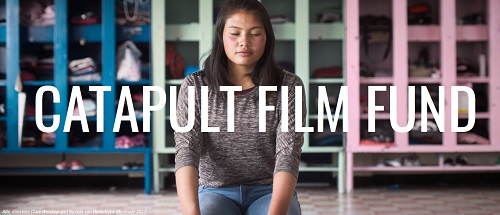Through their initiatives, the Catapult Film Fund aims to nurture unique voices and stories that might otherwise go unheard
by Carole Dean
I had the honor of interviewing Megan Gelstein and Theresa Navarro from the Catapult Film Fund on my The Art of Film Funding Podcast.

The Catapult Film Fund was launched in 2010 with the intent to support documentary filmmakers with development funding at the earliest stages. Catapult offers early funding and mentorship to propel films forward and supports filmmakers with authentic voices who tell stories with integrity, creativity, a cinematic vision, and a strong perspective.
The fundamental idea was to provide funding for documentaries at a stage where there was very little support. At this point of development, filmmakers often had no proof of concept, sample, or trailer. Catapult is dedicated to supporting nonfiction filmmakers with critical early stage funding and mentorship to launch distinctive, story-driven, and cinematic films
“We look for filmmakers who are envisioning a film that asks really engaging questions and embraces the language of cinema. Whether or not they’re clear on the exact forward motion of the story, at its core we’re looking for great stories with great characters.”
Catapult offers two primary grants, the Development Grant and the Research Grant.
The Development Grant is Catapult’s flagship program, launched in 2010. These grants are $25,000 in non recoupable grant funding and are designed for, “filmmakers who have a clear sense of the project that they want to make, they have access to their characters, and they’re pretty well ready to go.”
Catapult takes a personal approach with the filmmakers they support. Megan went on to say that the “we look at the application as an opportunity for us to get to know the filmmaker, and then ultimately for the filmmaker to get to know us.” Catapult staff serve as ongoing advisors and advocates for supported filmmakers, sharing industry knowledge and introducing them to members of the film industry who can fund and provide meaningful guidance for their work.
Catapult Film Fund reviews applications for the Development Grant in two rounds per year. The first round is open from January – mid February, with final decisions by June. The second round is open from June – mid July. They make final decisions by early November. The Development Grant is open to domestic and international filmmakers and, “our final annual slate tends to have an equal number of domestic and international filmmakers,” said Megan.
The Research Grant is the newest expansion and expression of Catapult’s commitment to providing support when it is riskiest to give and hardest to find. Launched in 2021, the Research Grant was designed specifically to help filmmakers in early stages of development for their projects, when filmmakers don’t have all the questions answered, when their projects are not yet fully “buttoned up.” It was created to support filmmakers whose projects are at an earlier stage than would be required to be eligible for the Development Grant.
The Research Grant awards a combination of $10,000 of non recoupable grant funding and six months of professional mentorship. It is open to US based filmmakers only.
Through this program, a cohort of filmmakers with projects in the research stage will be selected by Catapult staff and the Catapult Advisory, which is made up of experienced filmmakers and industry members. Selected filmmakers will receive funding and participate in a six-month mentorship program, which will include peer support and one-on-one mentorship from both Catapult staff and members of the Advisory.
Listening to the director’s voice.
Rather than focusing on the importance of the subject matter of the film, their priority is to get to know the filmmaker and their unique take on the subject.
“One of the key bits of advice that I might give to a filmmaker thinking of applying to Catapult,” Megan pointed out, “is we are really interested in hearing your particular voice and understanding your vision as a filmmaker.”.
“I think we have a pretty good sense of what the key issues are that filmmakers tend to gravitate towards. So as opposed to highlighting, the urgency of climate change, kind of fair more towards how you as a director want to tell that particular story.”
Expand your creativity in a supporting environment.
About the mentorship aspect, Megan believes that “especially in the research stage, it’s such a prime opportunity to take risks, to think of different ideas, to hear other people kind of weigh in on what you’re trying to do, and that can accelerate that path of thinking.”
The application window opens for the Research Grant once a year in October, and final decisions are made by January.
I asked about the application process and what they are looking for from their applicants.
“The process of applying both for the Research Grant and for the Development Grant are very similar,” per Megan. “The application can be found on our website at catapultfilmfund.org.
“The questions are pretty straightforward and it’s not too difficult of an application. Mostly, we’re asking for generally who those filmmakers are, what their background is, and what they’re interested in. It’s not necessarily tied to a particular project. We don’t ask for a super buttoned up log line, but we do ask for general ideas of what you’re thinking of.”
Rough Cut Retreat
In addition to the two grants, Catapult offers another very unique program called the Rough Cut Retreat. Theresa explained that the program “is a partnership that we run with the True/False Film Festival and CMP (Community, Media and Philanthropy – also known as Chicago Media Project).
“Every year, for five days in the summer, we invite five film teams who have a project at the rough-cut stage. Essentially, we also invite five experts from the industry. Sometimes these are editors, sometimes these are directors, sometimes these are film executives who have a lot of experience of giving pointed feedback on a project at a particular time.
“This is really a chance to be in community, to be in nature and to really have dedicated time and conversation around your project that is both with structured time including screenings that are dedicated to your film with folks who are giving feedback for your particular film, as well as time where people can just be together, sharing meals, maybe sitting by a river or at a swimming hole and naturally, organically, conversation can arise.”
Applications for the Rough Cut Retreat open in March, and decisions are made by late May or June. The retreat takes place in late July.
We are so lucky to have the Catapult Film Fund. This is a terrific resource for non-fiction filmmakers in early phases of development. I highly encourage filmmakers to consider applying for their supportive grants and programs. You can learn more at catapultfilmfund.org.
You can listen to the entire interview in link below.
The Art of Film Funding Podcast is available on iTunes, Stitcher, Goodpods, and Blogtalkradio.
Carole Dean is president and founder of From the Heart Productions; a 501(c)3 non- profit that offers the Roy W. Dean Film Grants and fiscal sponsorship for independent filmmakers.
profit that offers the Roy W. Dean Film Grants and fiscal sponsorship for independent filmmakers.
She is creator and instructor of Learn Producing: The Ultimate Course for Indie Film Production. 26 classes which will teach indie filmmakers how to produce their films.
She hosts the weekly podcast, The Art of Film Funding, interviewing those involved in all aspects of indie film production. She is also the author of The Art of Film Funding, 2nd Edition: Alternative Financing Concepts. See IMDB for producing credits

